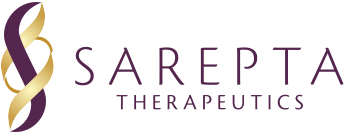« Back
Sarepta Therapeutics and Nationwide Children’s Hospital Announce FDA Clearance of IND for Micro-Dystrophin Gene Therapy Program for the Treatment of Duchenne Muscular Dystrophy
11/06/17 8:30 AM EST
-- Nationwide Children’s Hospital to initiate a Phase 1/2a clinical trial at potentially therapeutic doses in children with DMD by
-- First micro-dystrophin gene therapy program in clinical development for DMD --
The clinical trial will be conducted at Nationwide Children’s with
Parent Project Muscular Dystrophy (PPMD) committed
“As the first systemic micro-dystrophin gene therapy program enters the clinic, we mark an important milestone in our journey to relentlessly pursue new therapies to treat DMD,” said
“This will be the first clinical trial for DMD to treat patients as young as three months old and is an important step forward in our quest to diagnose patients through newborn screenings,” said Dr. Mendell, leader of the neuromuscular gene therapy program at
“With this clinical trial, we are laser-focused on giving each patient the best possible chance of a successful outcome,” said Dr. Rodino-Klapac, principal investigator at the
“Parent Project Muscular Dystrophy is thrilled by the continued momentum of Nationwide Children’s micro-dystrophin gene therapy program and we are grateful for Sarepta’s support of this revolutionary approach to treat Duchenne. PPMD has long supported innovative approaches to slowing the progression of Duchenne and we could not be more pleased with the work of Drs. Mendell and Rodino-Klapac. This kind of collaboration amongst researchers, industry and patient advocacy groups has the potential to help us achieve our mission to end Duchenne,” said
DMD is a fatal genetic neuromuscular disorder affecting an estimated one in approximately every 3,500 - 5,000 males born worldwide.
About the Phase 1/2a Clinical Trial
The Phase 1/2a clinical trial is a pilot study to evaluate safety, biological activity, and efficacy of the rAAVrh74.MHCK7.micro-Dystrophin vector administered through the circulation through an intravenous catheter in the arm. This study will evaluate the micro-dystrophin vector for its capacity to replace the missing muscle dystrophin in Duchenne muscular dystrophy. Twelve patients in two cohorts will undergo gene transfer to establish maximum tolerated dose (MTD) avoiding toxicity. Cohort 1 will include infants 3 months to 3 years of age with DMD. Cohort 2 will include DMD boys 4 years old to 7 years old. Patients will be enrolled sequentially starting with Cohort 2. All boys in this clinical trial will receive a total dose of 2E14 vg/kg.
About
Named to the Top 10 Honor Roll on U.S. News & World Report’s 2016-17 list of “America’s Best Children’s Hospitals,” Nationwide Children’s Hospital is one of America’s largest not-for-profit freestanding pediatric healthcare systems providing wellness, preventive, diagnostic, treatment and rehabilitative care for infants, children and adolescents, as well as adult patients with congenital disease. As home to the Department of Pediatrics of
About Sarepta Therapeutics
Forward-Looking Statements
This press release contains "forward-looking statements". Any statements contained in this press release that are not statements of historical fact may be deemed to be forward-looking statements. Words such as "believes," "anticipates," "plans," "expects," "will," "intends," "potential," "possible" and similar expressions are intended to identify forward-looking statements. These forward-looking statements include statements regarding the Nationwide Children’s Hospital’s plan to initiate a Phase 1/2a clinical trial at potentially therapeutic doses in children with DMD by
These forward-looking statements involve risks and uncertainties, many of which are beyond Sarepta’s control. Known risk factors include, among others: the expected benefits and opportunities related to the collaboration with Nationwide Children’s may not be realized or may take longer to realize than expected due to challenges and uncertainties inherent in product research and development; the collaboration with Nationwide Children’s may not result in any viable treatments suitable for commercialization due to a variety of reasons including the results of future research may not be consistent with past positive results or may fail to meet regulatory approval requirements for the safety and efficacy of product candidates or may never become commercialized products due to other various reasons including any potential future inability of the parties to fulfill their commitments and obligations under the agreement, including any inability by Sarepta to fulfill its financial commitments to Nationwide Children’s; and even if the collaboration results in commercialized products, the parties may not achieve any significant revenues from the sale of such products; and those risks identified under the heading “Risk Factors” in Sarepta’s most recent Annual Report on Form 10-K for the year ended
Any of the foregoing risks could materially and adversely affect the Company’s business, results of operations and the trading price of Sarepta’s common stock. For a detailed description of risks and uncertainties Sarepta faces, you are encouraged to review Sarepta's 2016 Annual Report on Form 10-K and most recent Quarterly Report on Form 10-Q for the quarter ended
Internet Posting of Information
We routinely post information that may be important to investors in the 'For Investors' section of our website at www.sarepta.com. We encourage investors and potential investors to consult our website regularly for important information about us.
Source:
Media and Investors:
iestepan@sarepta.com
or
breid@w2ogroup.com
Source: Sarepta Therapeutics, Inc.
This section of our website may contain dated or archived information which should not be considered current and may no longer be accurate. For current information, you are encouraged to review our most recent official corporate documents on file with the U.S. Securities and Exchange Commission.
